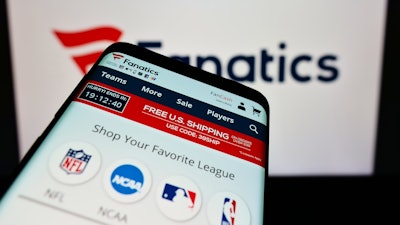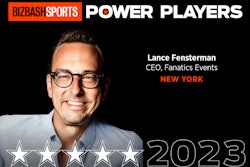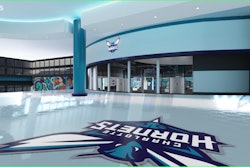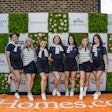
After 17 years of running top conventions like New York Comic Con and PAX, Lance Fensterman is something of an expert in serving passionate fan communities. So it's only appropriate that, for his next gig, he's setting his sights on a company called Fanatics.
With Fensterman's help, the massively popular digital sports platform and online retailer—which is currently valued at a whopping $31 billion—is launching Fanatics Events. The new business (which has IMG as a minority owner and event partner) will feature live experiences geared toward collectors, incorporating everything from past and current athletes to activations by major brands in the collecting, footwear, and apparel worlds to trading card and memorabilia exhibitions to fan and collector education, and more. The team hopes to host its first live events in early 2024.
 Fanatics Events CEO Lance FenstermanPhoto: Courtesy of Fanatics
Fanatics Events CEO Lance FenstermanPhoto: Courtesy of Fanatics
I’d love to hear how this job came to be. It sounds like they first called you just to pick your brain, and it morphed into an offer.
Fanatics was interested in looking at the live event space, and how they could get involved and grow it a little bit. …. We had a nice, casual conversation about how to approach events, things that matter, what the business models look like. Eventually, it became a more serious conversation.
Fanatics CEO Michael Rubin is a really visionary entrepreneur, just an enigmatic force of nature. We found we have similar backgrounds in not really being formally educated—I’m sitting here talking to this wildly successful entrepreneur and we’re comparing how bad our SAT scores were! [Laughs] It just showed me this is a place that values output, creativity, and results rather than just a certain pedigree—and I felt, this is a guy I’d love to learn from.
So what types of events and community-building experiences are you imagining? Can you tease anything that’s in the works?
It's a lot of imagining right now—and in a great way, moving in a lot of different directions at once. When we built ReedPop, like a lot of event businesses, it was about launch, acquisition, and, where appropriate, joint ventures. So we’re doing that here.
In the world of sports-fan live events, there aren’t a lot of big events of scale. So acquisition is going to be more about finding smaller, niche things that have elements we really value. So we’ve defined the needle we’re looking for, and now we’re busy digging through the haystack to see if there are great operators out there we can partner with. It’s about looking far out on the horizon, and every day making a bit of incremental progress.
But what we hope those large-scale events will look like eventually is having sports memorabilia and trading cards and collecting at the center, and then starting to grow from there to bring in elements of film and television, entertainment, music, athlete signings, fashion, and even hands-on things like three-on-three tournaments. So all of these things are surrounding that core of collectors and fans, in the belief that will bring in those more casual sports fans that are interested in different elements of the universe.
It’s about serving this hardcore group of collectors and growing from there to create a kind of Comic Con for sports.
Speaking of Comic Con, you're something of an expert on fandom after 17 years spent developing top conventions like New York Comic Con, PAX, and Star Wars Celebration. Do you think there’s a lot of overlap between sports fandom and the comics/gaming/pop culture world you came from?
I would often talk about New York Comic Con as a place based on shared experience—which is a lot like going to a sporting event. You want to be next to fellow fans when a play happens, whether you win or you suffer the agony of defeat. My wife is a Jets fan, so I’m pretty familiar with losing and the pain that comes with that. [Laughs] It’s a shared experience.
Sports fans also often want to know the story behind the story—to know what was happening in an athlete’s mind during a huge moment. But then I think it even goes further, where these hardcore fans are also interested in what these athletes are interested in, like their business ventures or favorite music or their lives. Fans love that sort of context, and I think it builds a sort of porous connection between those people that they love and idolize and celebrate, and the fans themselves.
I think all of that is really quite, quite similar between the world of popular culture and the world of sports. And it's great to be able to leverage some of that really core experience and core feelings from one thing to another.
You touched on it a bit, but what do you think is working right now in fan-centric events? I think authenticity is a big one.
Authenticity for sure, but also inclusiveness is critical—making things that are accessible, in every sense of the word, to as many people as possible. Certainly, a learning I've had is that we will always have a digital component, which is a form of accessibility, whether it’s for geography or economics. It’s about allowing people to participate from afar during [an event] but also after, whether that's through downloadable content or content on demand.
I think for fandom in general, 10 to 12 years ago we needed to tell the story of why these hardcore, passionate fans were so valuable and meaningful and important to brands. But that story really doesn't need to be told anymore—it's accepted as fact.
What are you most excited about with the new role?
Not knowing what I'm doing, and really embracing being out in space and not being tethered to tradition—even if I was fundamental in making that tradition [like at ReedPop]. I'm really excited about learning and challenging myself and being really out front with customers and fans and potential partners again. Instead of running a business, I'm excited about building a business.
I'm also really excited about the potential of what Fanatics as an overall organization can be. Fanatics is really dedicated to becoming all things to all fans—and they have the talent, the resources, and the ambition to do it. You feel like you are a part of something big. And it makes me feel incredibly motivated to help fuel the vision and the energy that's propelling this place forward. I feel like I'm at a special place at a special time.
Anything else you want to add?
One thing I'm interested in is how what Fanatics is doing can also be additive to the event community in general. I've really valued being a part of that community and I've taken a lot from it, and I think it will be good for an outsider like Fanatics to be involved—whether that's vendors and partners [or] also associations—and saying, How can a company that is really focused on sports and entertainment and apparel be additive to the event community and bring a little bit of diversity of voice and thought to that as well?
That's awesome because it allows me to continue in a community that's been incredibly meaningful to my life and career, but in a different way where I'm adding something new, perhaps. And I've always enjoyed that sort of outsider-insider kind of vibe—where I feel a part of the community, but I'm not exactly like everyone else and I can bring a different quality to it. I'm eager to plug in and be a part of that.
This interview has been edited and condensed.



















